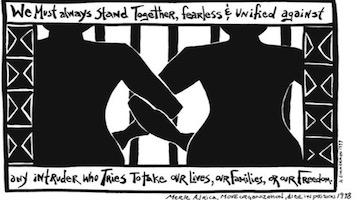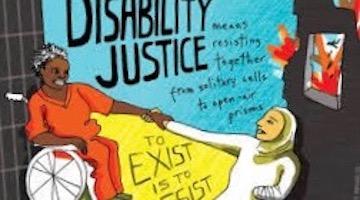Call for Submissions: Abolition Journal’s Special Issue on “Spirituality and Abolition”
This Call for Submission asks the question: what can prison abolition, and other abolitions, teach us about spiritual practice, spiritual journey, spiritual commitment?
“We seek essays, poetry, artwork and reflections.”
Abolition: A Journal of Insurgent Politicsis now accepting submissions for a special issue on “Spirituality and Abolition.” We’ve included the full Call for Submissions below in case BAR Readers would like to submit a piece for consideration in the issue. The original announcement can be found here in the Abolitionjournal’s website.
A Call for Submissions for an issue of the Abolition journal on “Spirituality and Abolition,” to be edited by Ashon Crawley and Roberto Sirvent.
Abolition is a spiritual practice, a spiritual journey, a spiritual commitment. What does abolition mean and how can we get there as a collective and improvisational project, how can we define it and get there as a desired and desirous practice? To make a claim for abolition as spiritual practice, journey and commitment is to consider the ways abolition — in the historical and contemporary sense including movements against slavery, prisons, the wage system, animal and earth exploitation, racialized, gendered, and sexualized violence, and the death penalty; movements against patriarchy, capitalism, heteronormativity, ableism, colonialism, the state, white supremacy, etc. — necessitates epistemologies that have been foreclosed through violent force by Western thought of philosophical and theological kinds, it is to claim that the material conditions that will produce abolition are necessarily Black, Indigenous, queer and trans, feminist, and also about disabled and other non-conforming bodies in force and verve.
This Call for Submissions asks what can prison abolition teach us about spiritual practice, spiritual journey, spiritual commitment?And, what can these things underscore about the struggle for abolition as a desired manifestation of material change in worlds we inhabit currently? To ask about the relation between abolition and spirituality is not to contend fundamentally with particular doctrines, creeds or theologies rooted in particularities of religious traditions, though those traditions in their particularities might create a path in the direction of such an idea and imagined possibility. It is to consider the ways abolition provides a framework for thinking with and also against the strictures of doctrine, creeds and theologies that have us contend against each other for purportedly squandered resources of imagined connection. To consider the relation of abolition to spiritual practice, spiritual journey, spiritual commitment, is to underscore the resurgence, survivance, reparation, and oppositional futurities of Black, Indigenous, queer and trans, feminist, and also about disabled and other non-conforming bodies imagination, being in worlds otherwise. We seek essays, poetry, artwork and reflections that attempt to think through these relations and relationalities.
Please submit abstracts to Ashon Crawley and Roberto Sirvent (ashon.crawley@gmail.com and rdsirvent@hiu.edu) by November 1, 2018. Final submissions will be due by March 1, 2019.
We also encourage submissions from incarcerated writers and artists. We can receive mail at:
Abolition: A Journal of Insurgent Politics
1321 N. Milwaukee Avenue
PMB 460
Chicago, IL 60622
COMMENTS?
Please join the conversation on Black Agenda Report's Facebook page at http://facebook.com/blackagendareport
Or, you can comment by emailing us at comments@blackagendareport.com














